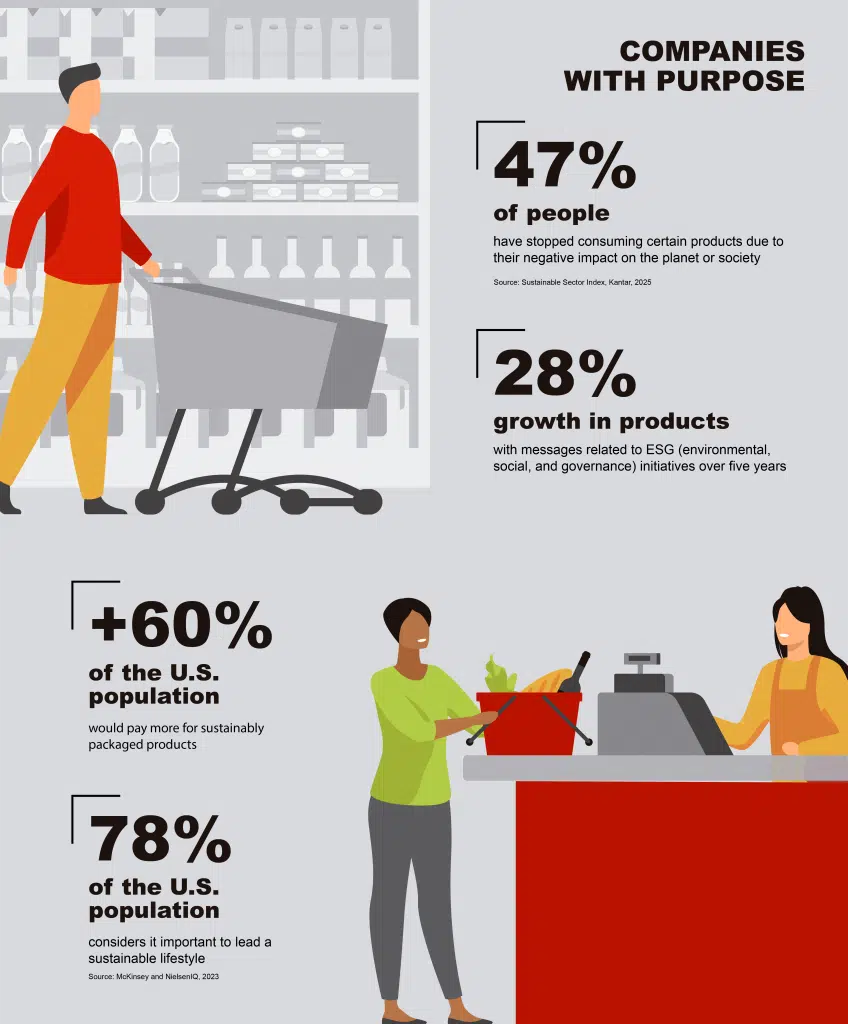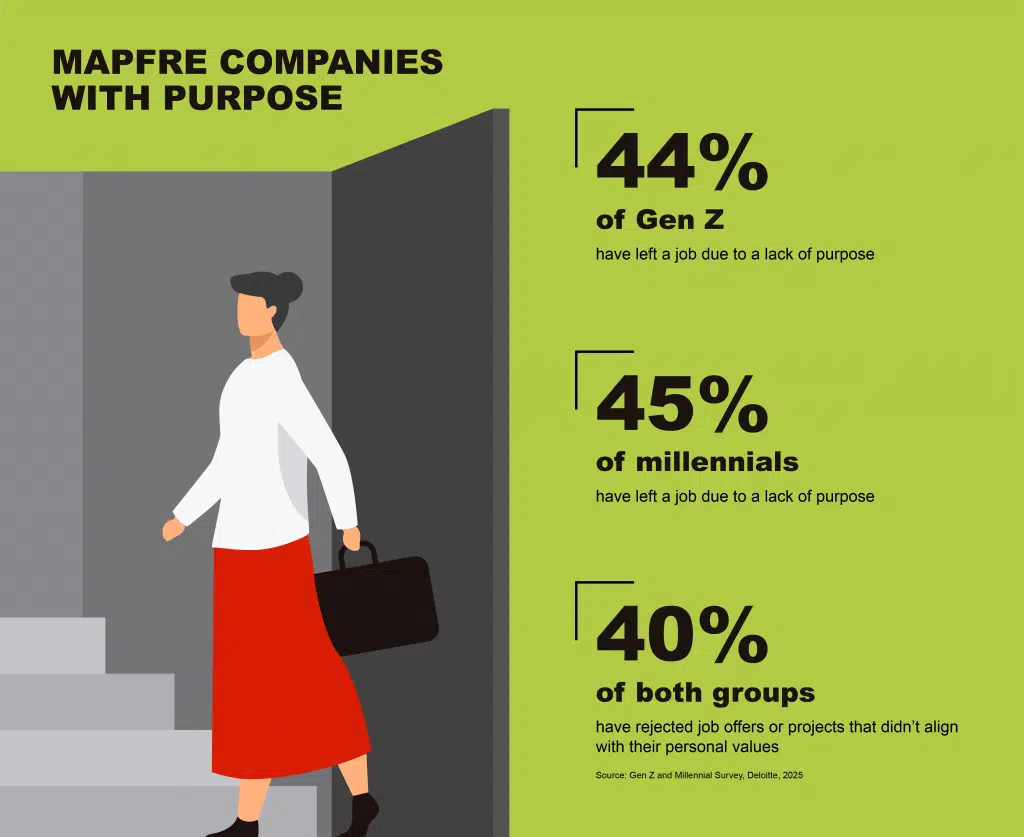SUSTAINABILITY | 09.23.2025
Purpose-Driven Companies: A Business Model That Prioritizes Social Impact
Today, a company's value is measured not only by what it sells, but by the impact it generates. Increasingly, companies are recognized as key agents in the transformation toward a more just and sustainable future.
Corporate purpose is what guides a company beyond generating economic profits. It encompasses the values that orient decision-making in all actions taken daily, both large and small. As noted by Martín-Herrero and Oliver-González, researchers from Universidad Alfonso X el Sabio, “corporate purpose has become, alongside CSR and sustainability, a new element of great importance for corporate communication and reputation.”
Having an authentic purpose means making a real commitment to people and the planet and translating it into concrete decisions. From this perspective, social responsibility is positioned as a central element of business strategy, not as an add-on. The shift from CSR toward the integration of environmental, social, and governance criteria also shows an evolution in how companies approach their responsibilities, where sustainability, in a broad sense, now occupies a central role. “While CSR traditionally focused on philanthropic initiatives and regulatory compliance, sustainability implies a deeper and more holistic integration of ethical principles across all business operations and strategies,” say Martín-Herrero and Oliver-González.
Having an authentic purpose means making a real commitment to people and the planet and translating it into concrete decisions
This evolution results from recognizing sustainable practices as beneficial not only for society and the environment as a whole, but also for organizational viability. This vision is also supported by the 2030 Agenda, which calls upon companies to assume their role as key actors in achieving the Sustainable Development Goals.
Purpose-driven companies are also profitable
Far from being a renunciation of economic growth, purpose has established itself as a lever for value creation and differentiation. For companies seeking to generate positive impact on society, it’s not enough to proclaim values; it’s necessary to align the business with them in a coherent and sustained manner over time. Various studies demonstrate that sustainability and social responsibility are key factors for long-term success: companies that integrate these principles generate value for their workforce, shareholders, and stakeholders, and manage to stand out in an increasingly competitive and demanding market.

For example, a McKinsey and NielsenIQ study on packaged consumer goods conducted in the United States reveals that products that made claims related to ESG initiatives had an average cumulative growth of 28% in the five years preceding the study, compared to 20% for products that made no such claims. This analysis, which includes different surveys conducted by the consulting firms, also states that more than 60% of the U.S. population would pay more for a product with sustainable packaging and that for 78%, living a sustainable lifestyle is important. Similarly, another study conducted by Kantar in 2025, the Sustainable Sector Index, states that 47% of people surveyed have stopped consuming certain products due to the negative impact of their companies. This data confirms that it’s no longer enough to say the right thing: you must do the right thing and do it with transparency.
When purpose becomes culture, it transforms the way we lead, relate, and create value
But, as we mentioned, purpose doesn’t only affect consumer behavior; it also shapes how companies are organized, led, and how their internal culture is developed, which becomes an essential element in attracting and retaining talent. In fact, the lack of purpose in the workplace negatively impacts motivation and emotional well-being. According to Deloitte’s Gen Z and Millennial Survey, four out of 10 members of these generations say that a lack of purpose at work contributes to anxiety and stress. This perception has a direct impact on their career decisions: 44% of Gen Z and 45% of millennials have left a job because they felt it lacked purpose, and around 40% of both groups have rejected job offers or projects that didn’t align with their personal values. These findings reflect a profound shift in workplace culture: purpose is a key factor in attracting talent, retaining employees, and building sustainable organizations.

What are purpose-driven companies like?
At MAPFRE, we work every day to demonstrate that running a business based on purpose isn’t just possible, but essential. It’s essential to adapt to a changing world, to respond to new social and environmental demands, and to remain relevant in a context where the public expects more from companies. When purpose becomes part of the culture, it transforms the way we lead, interact, and create value. That’s why it’s not just about defining an inspiring mission, but about translating it into real, measurable, and sustainable commitments. Our purpose centers on taking care of everyone who is part of the company—customers, employees, shareholders, and partners—and, ultimately, everything that impacts on our society. This purpose, “We care about what matters to you”, materializes through concrete actions included in our Strategic Plan 2024-2026, which integrates profitable growth targets with a strong social and environmental commitment.
Our role as an insurer places us in a privileged position to detect vulnerabilities, anticipate scenarios, and propose solutions
On the economic front, the company has raised its profitability and efficiency objectives and maintains a solid financial position and a responsible approach to value distribution. At the same time, the Sustainability Plan includes our most important commitments for 2026, such as achieving carbon neutrality in our operations in 15 countries, ensuring that 95% of our investment portfolio is qualified with ESG criteria, and continuing to advance gender equality, with 36% women in management positions, and inclusion, with 3.5% of the workforce comprised of people with disabilities.
Our work is guided by international commitments and the Sustainable Development Goals (SDGs) to operate with a long-term view and in coordination with other social and economic actors. This year, for example, we will participate in the United Nations Conference on Climate Change (COP30), which will be held in Belém do Pará, Brazil, a symbolic region due to its connection with the Amazon and biodiversity conservation. Our participation in this forum allows us to contribute our experience as a key actor in climate risk management, prevention, and reduction, and to reinforce our commitment to a just energy transition. A transition that cares for the planet, people, employment, and the business fabric.
We know that profound transformations cannot be achieved alone. Therefore, in addition to acting from within, we also collaborate with other entities, share knowledge, and participate in alliances that promote systemic change. Our role as an insurer places us in a privileged position to detect vulnerabilities, anticipate scenarios, and propose solutions. But it also implies great responsibility: contributing to building a more just, inclusive, and sustainable future.
RELATED ARTICLES:




